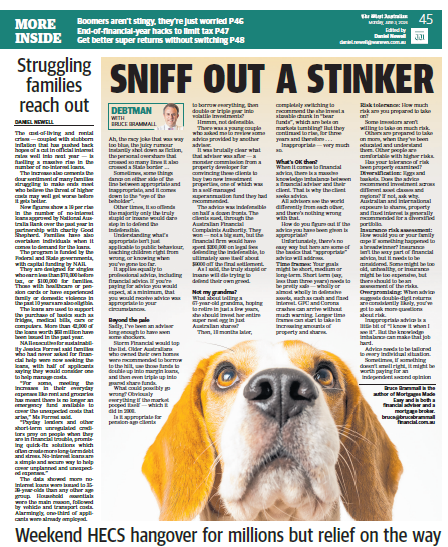
Bruce Brammall, The West Australian, 3 June 2024
Ah, the racy joke that was a way too blue, the juicy rumour instantly shot down as fiction, the personal overshare that crossed so many lines it also crossed a state border …
Sometimes, some things dance either side of the line between appropriate and inappropriate. And it comes down to the “eye of the beholder”.
Other times, it’s so offends the majority that only the truly stupid or insane would dare step in to defend the indefensible.
Understanding what’s appropriate isn’t just for applying to public behaviour, or teaching children right from wrong, or knowing when you’ve gone too far.
It applies equally to professional advice, including financial advice. If you’re paying for advice, you would expect, at a minimum, that you would receive advice that was appropriate to your circumstances.
Beyond the pale
Sadly, I’ve been an adviser long enough to have seen some shockers.
Storm Financial would top the list. Older Australians, who owned their own homes, were recommended to borrow to the hilt, use those funds to double up into margin loans and then even triple up into geared share funds …
What could possibly go wrong? Obviously everything if the market pooped itself. Which it did in 2008.
Is it appropriate for pension-age clients to borrow everything, then double or triple gear into volatile investments? Hmmm, not defensible.
There was a young couple who asked me to review of some advice provided by another adviser. It was brutally clear what that adviser was after – a monster commission from a property developer for convincing these clients to buy two new investment properties, one of which was in a SMSF they had recommended.
The advice was indefensible on half a dozen fronts. Clients sued, through the Australian Financial Complaints Authority. They won. Not a big sum. But the financial firm would have spent $200,000 on legal fees defending the indefensible, to ultimately save themselves about $9000 off the final settlement.
As I said, the “truly stupid or insane” will die trying to defend their own greed.
Not my grandma?
What about telling a 67-year-old grandma, hoping to retire in just a few years, she should invest her entire super nestegg into just Australian shares?
Then, 18 months later, completely switch to recommend she invest a sizeable chunk into “bear funds”, which are bets on markets tumbling? But they continued to rise, for three years and therefore …
Inappropriate, much?
What’s okay then?
When it comes to financial advice, there is a massive knowledge imbalance between a financial adviser and their client. That is why the client seeks advice.
All advisers see the world differently to each other and there’s nothing wrong with that.
How do you figure out if the advice you have been given is appropriate?
Unfortunately, there’s no easy way. But here are some of the basics that “appropriate” advice will address.
Timeframes: Your goals might be short, medium or long term. Short term (say, under three years) needs to be pretty safe – wholly or almost wholly in defensive assets, such as cash and fixed interest. GFC and Corona crashes can arrive without much warning. Longer time frames can start to take in increasing amounts of property and shares.
Risk tolerance: How much risk are you prepared to take on? Some investors aren’t willing to take on much risk. Others are prepared to take on more, when they’ve been educated and understand the risks. Other people are comfortable with 9higher risks. Has your tolerance to risk been properly examined?
Diversification: Eggs and baskets. Does the advice recommend investment across different asset classes and regions? If not, ask why. Australian and international exposure to shares, property and fixed interest is generally recommended for a diversified portfolio.
Insurance risk assessment: How would you or your family cope if something happened to a breadwinner? Insurance isn’t the sexy part of financial advice, but it needs to be considered. Some might be too old, unhealthy, or insurance might be too expensive, but there should to be an assessment of the risks.
Overpromising: When advice suggests double digit returns are consistently likely, you’ve got to ask more questions about risk.
Inappropriate advice is a little bit of “I know it when I see it”. But the knowledge imbalance can make that job hard.
Advice needs to be tailored to every individual situation.
Sometimes, if something doesn’t smell right, it might be worth paying for an independent second opinion.
Bruce Brammall is the author of Mortgages Made Easy and is both a financial adviser and mortgage broker. E: bruce@brucebrammallfinancial.com.au.